Body to Brain Learning Courses & Support:
Body to Brain Learning Courses:
"The Body Writes & Tells the Learning Story:
A Neurodevelopmental Perspective for Practitioners"
Practitioners:
Are you looking for a reliable way to explain the neurodevelopmental foundations of learning to your clients?
This evidence-informed course provides clear, practical explanations of how early movement patterns influence learning success.
This short course offers a comprehensive introduction to body-brain learning connections, neuromotor development, and sensory system maturity. Learn why this approach is appropriate for your practice and access bonus offerings to support your practice. Use "The Body Writes & Tells the Learning Story: A Neurodevelopmental Perspective for Parents and Teachers" (below) as a way of building client understanding that validates your therapeutic approach.
Included in this course are some bonus offerings to further enhance your practice.
Join NOW for $19 (AUD)
"The Body Writes & Tells the Learning Story:
A Neurodevelopmental Perspective for Parents and Teachers"

Parents and Teachers:
Do you wonder why some children struggle with learning despite their best efforts?
This accessible course explains how early movement patterns and development influence learning success.
Dr. Christine Payard shares clear, practical insights into the body-brain learning connection, helping you understand why some children find learning challenging.
Discover a fresh perspective on learning difficulties and gain valuable insights into how neurodevelopment in the first years and movement-based approaches can support learning development.
Join NOW for $19 (AUD)Vision and Learning: A Masterclass
"Children often can't tell you if they have a vision difficulty, but their body and behaviour will." [Dr Christine Payard (PhD)]
Part of our Masterclass Series: "How the Body Tells the Learning Story," this special Masterclass is back by popular demand.
Vision and learning is not just a matter of seeing clearly; it's about how our eyes work, and how our brain processes what we see to make sense of our learning world.
This recording of our Masterclass in 2021 provides insight into the importance of understanding the role of vision in learning. It's 50-minutes with some very thought-provoking questions about vision and learning and can be accessed online immediately.
The body tells us about Vision and HOW students learn. This Masterclass explains how.
Minimum fee: $10, or pay what you feel led to pay.
Sign up NOW for immediate access to this Masterclass.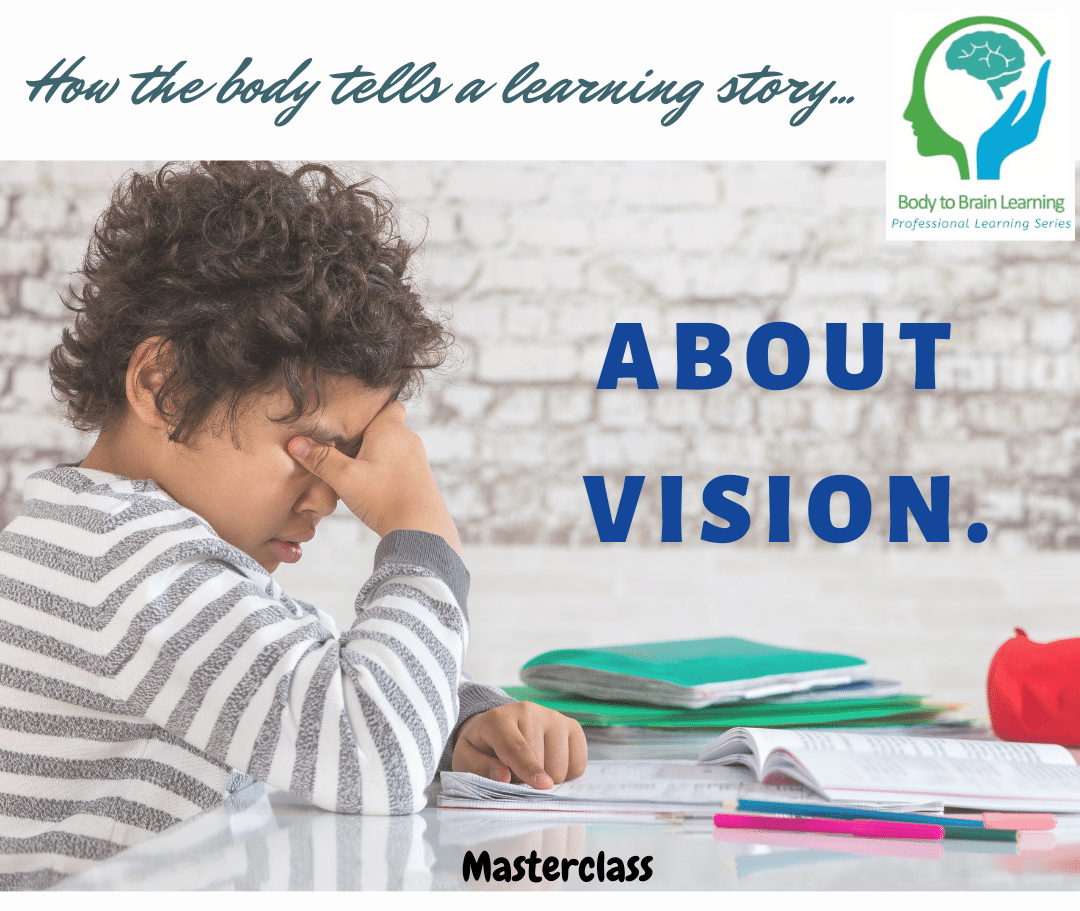
Body to Brain Learning Professional Learning :
"Body to Brain Learning @ School"
A course for educators and those who want to know more about using this approach in learning/school situations.
"The body trains the brain and grows the mind preparing it for learning." [Christine Payard (PhD)]
This is a professional learning opportunity for primary, ECE and secondary educators, contextualised for Australian Education, including connections with the Australian Curriculum and meeting requirements for inclusive education in schools.
Participants learn about the importance of the body to brain connections that fashion our learning experiences, when they develop and what immaturity in these foundational learning systems looks and sounds like in their classrooms.
Participants learn to identify, screen for and then address neuro-motor and sensory immaturity (sometimes referred to as "neurodevelopmental delay") that often underpins student learning challenges and difficulties in school environments.
Implementing this approach in schools has resulted in:
- increased engagement of learners,
- creating readiness for learners,
- enhancing learning potential by looking at underlying neuro-motor and sensory foundations of learning, and
- greater professional satisfaction for teachers because students are more settled.
Teachers will be able to identify underlying reasons for learning challenges and address them using non-invasive daily activities based on principles of Universal Design for Learning (UDL) and neuroplasticity.
"Body to Brain Learning @ School" includes a mentoring component to support staff in the implementation of the approach.
This course is delivered in mixed mode with online and face-to-face components, is aligned to the Australian Professional Standards for Teachers and can be used for self-reporting CPD.
Course delivery can be customised to meet individual school, school clusters, or education system requirements.
Contact us: [email protected] for more details.
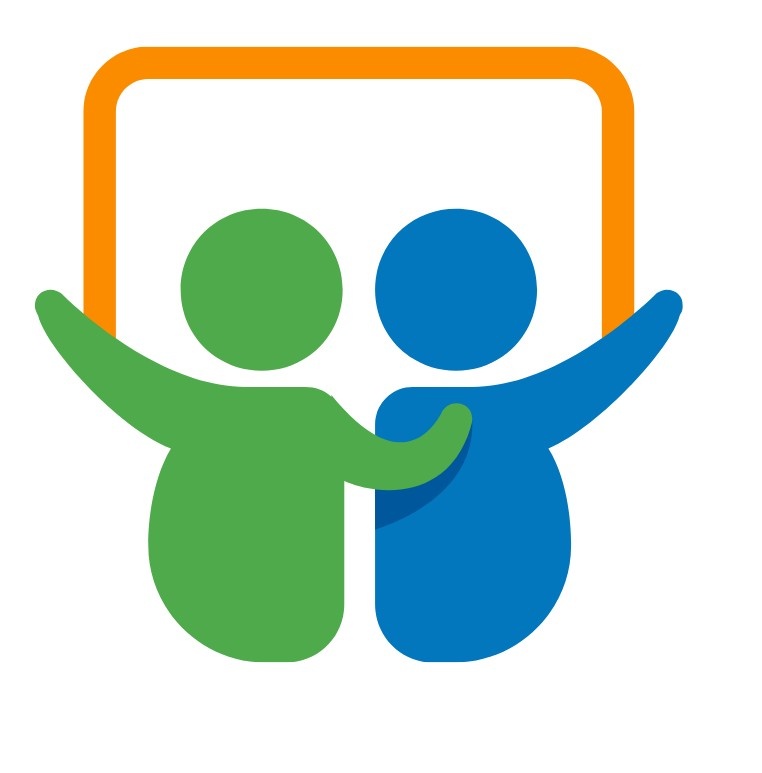
GROWING YOUR
NEURO-DEVELOPMENTAL PRACTICE:
Practice Building Products:
The Brainbow®
A Neurodevelopmental Model of Learning TM
Need help explaining your neurodevelopmental work to your clients?
Is it challenging explaining your neurodevelopmental approach: what you do and why you do it?
If a picture paints a thousand words, what impact does a hands-on model have in sharing the story of what you do, why you do it and how it can help the learning and function of your clients? Turns out, it helps a lot! AND, that's where the Brainbow® our Neurodevelopmental Model of Learning® is useful.
"The Brainbow®" is a hands-on model that shows the importance of neuromotor and sensory development, the sequences and processes in early brain development, and the role they play in laying the foundations for learning success.
Our model has helped neurodevelopmental practitioners, teachers, early years educators, allied health care practitioners, neurodevelopmental optometrists and others around the world explain their work to their clients, their families, and other practitioners.
The Brainbow has helped neurodevelopmentally focused practitioners build their practice because the model is simple. It's clear and it shows what happens to academic learning if there are gaps in neurodevelopment at key stages of our lives.
Brainbow® Kit
Make your own Brainbow®. All the parts will be mailed to you as well as online access to instructions and more detailed information about the parts and labels on the Brainbow®, how to use it, and other resources to explain your work to your clients and others.
Learn more about the Brainbow® Kit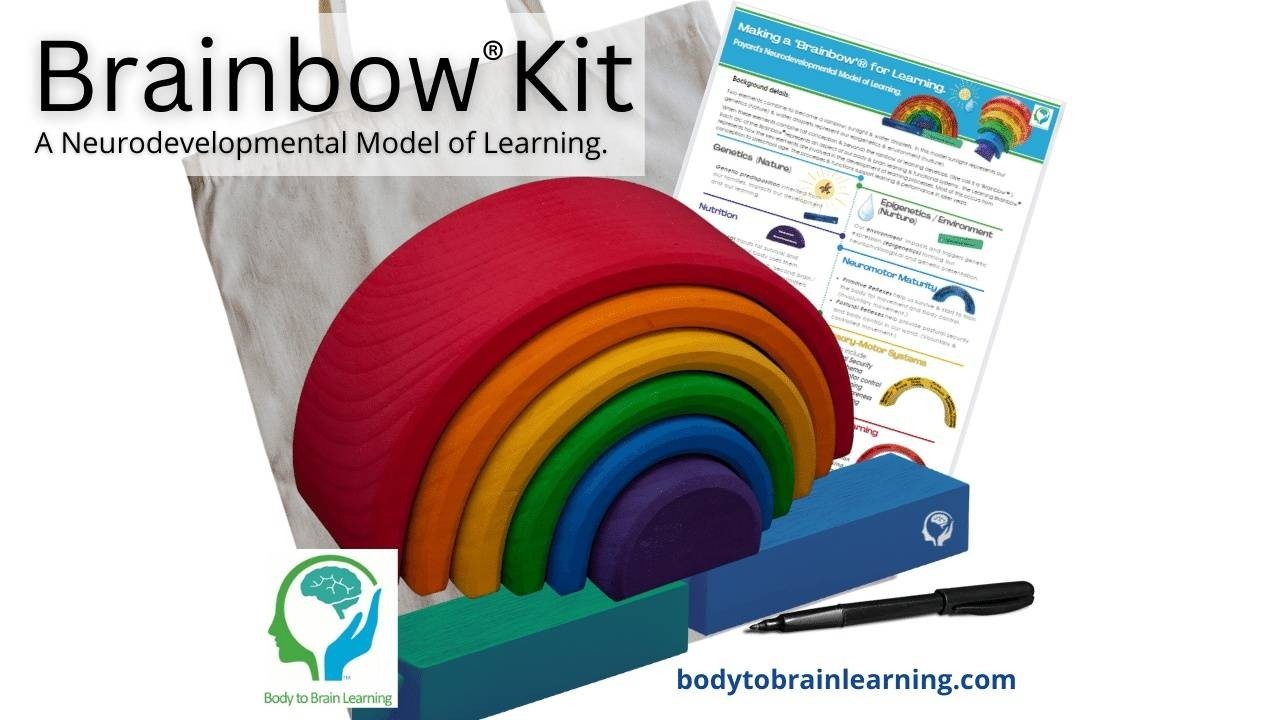
Australian and International postage options available. (The Brainbow® is not yet available in other languages, but that is being explored. Please contact us if you are interested.)
Buy one nowCOACHING & MENTORING: GROWING YOUR NEURO-DEVELOPMENTAL PRACTICE
CONTINUING SUPPORT for NEURODEVELOPMENTAL PRACTITIONERS:
Ongoing support, conversations, collaboration, advice and learning opportunities are offered to Neurodevelopmental Practitioners who have worked or trained with Dr Christine Payard (PhD).
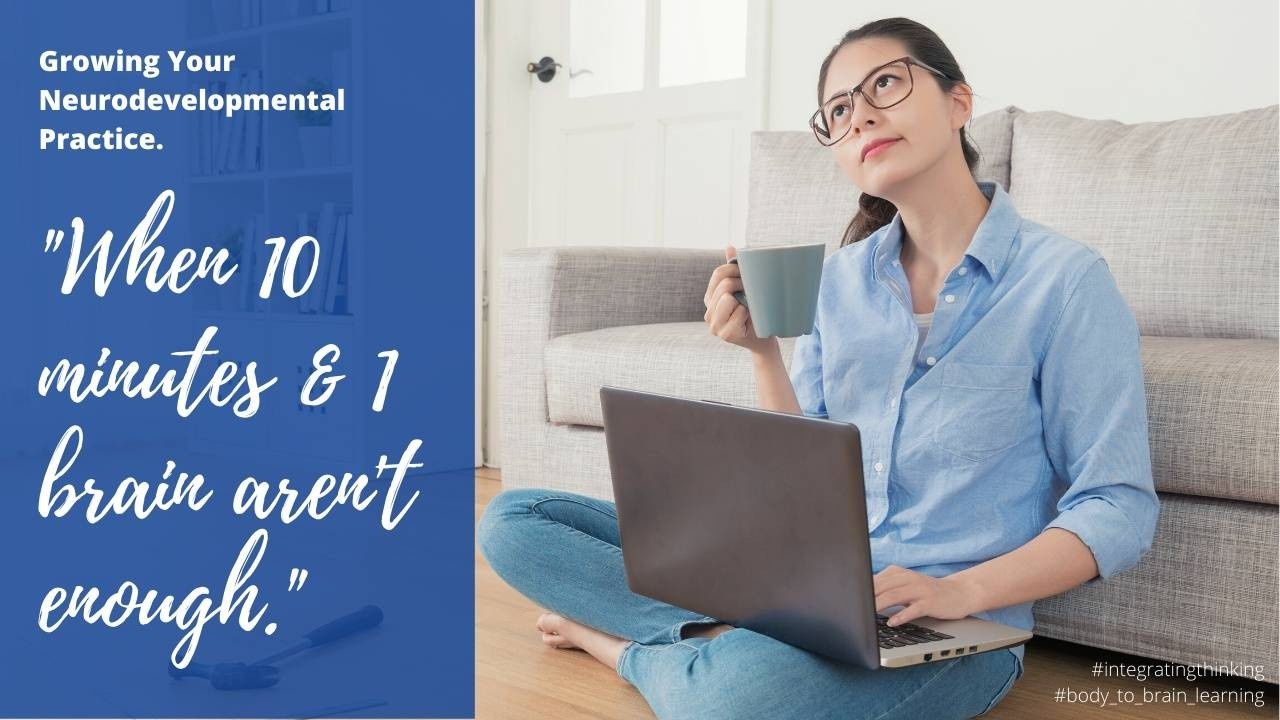
Schedule a one-hour chat with Chris
Focus on clinical or business topics in a 60-minute conversation with Christine Payard.
Sometimes you need a sounding board, someone who knows your work and understands the challenges of practice and practice building.
Sometimes you may need someone to help you think through and problem solve an unusual situation.
Sometimes you just want to know you're on track and get some pointers to refine your practice.
Two brains and one hour can achieve a lot.
"I love these sessions and the opportunity to work closely with you regarding my practice. It's so useful. Thanks."
(Sarah, Neurodevelopmental Practitioner.)
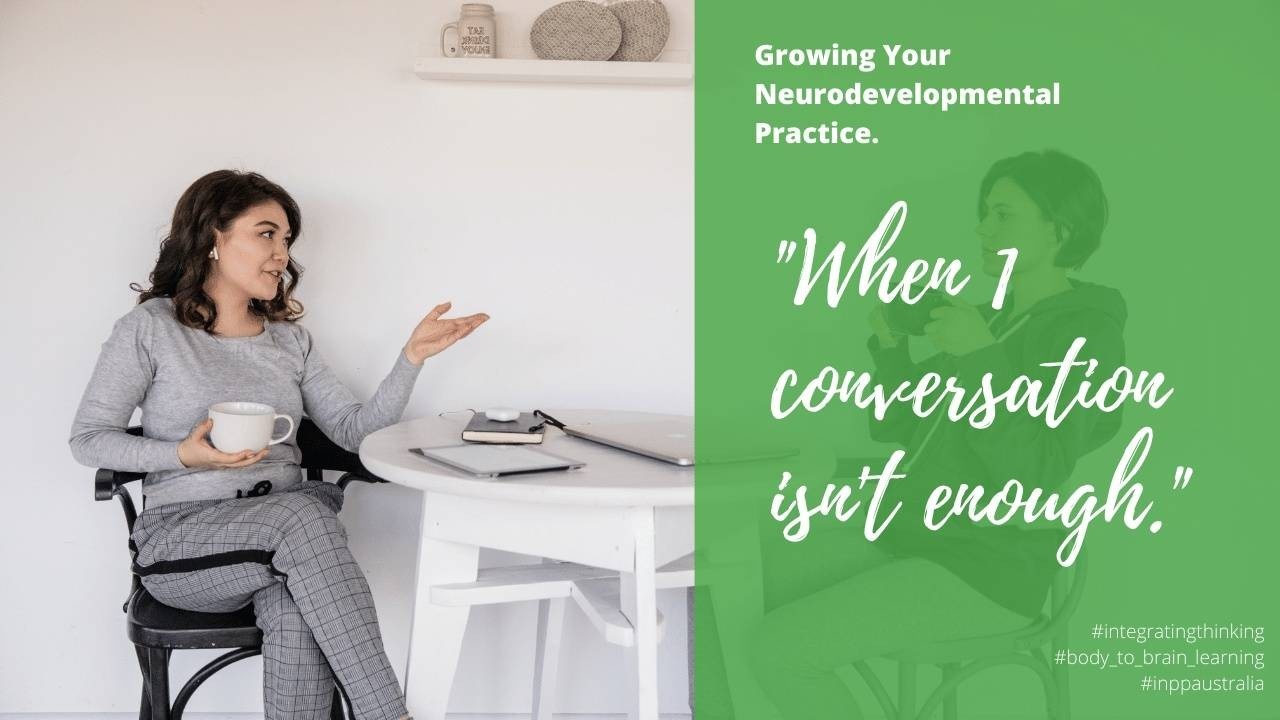
Create a package of conversations,
OR,
Schedule a one day, one-to-one VIP opportunity with Chris that includes a 1 1/2-hour follow-up session.
Schedule a package of regular one-to-one conversations over 8 months with Christine Payard (Director of Integrating Thinking and Body to Brain Learning.)
Focus on clinical or business topics that can help build your neurodevelopmental practice.
Sometimes you need a regular conversation so that you can be kept accountable, so that there's consistency, growth and regular support over time. And, it's good to chat with someone who has experience in your field.
Two brains and regular, focused contact can achieve more.
The VIP Session consists of a full day (6 1/2 hours one day) with a subsequent follow-up call at a later date (1 1/2 hours).
Email: [email protected] to personally arrange this package/option.
REFERENCE BOOKS:
"Professionally Developing Teachers: Teachers Developing Professionally."
by Christine Mensinga-Payard
Stories of three primary school teacher's professional development experiences including how they learned and what they learned in their professional development at school.
Three primary school teachers from North Queensland were part of a Narrative Inquiry research project shedding light on the ways teachers learn once they are in the field. The inquiry was inspired by these questions: "How do teachers respond to professional development opportunities in their school? What does real professional learning look like in a school setting? How can we best support ongoing learning for teachers in the field?" Published in 2010.
Buy one hereRecommended reading in the "Body to Brain Learning" field of work includes books by Sally Goddard-Blythe.
The work described in these books and the INPP® Method contribute to the theoretical and practical background used in our "Body to Brain Learning" Professional Learning opportunities.
Introductory reading recommendations for parents and professionals include the following books by Sally Goddard-Blythe.:
- The Well Balanced Child
- Movement Your Child's First Language
- Reflexes, Learning and Behaviour
- Attention Balance and Coordination
- Raising Happy and Healthy Children
- The Genius of Natural Childhood



